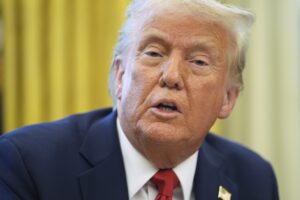Northern Elders showing Buyer’s Remorse for Backing Tinubu in 2023
It seems unthinkable that the wealthy and powerful cattle-herding class could be on the margins of President Bola Tinubu’s ruling clique, but it’s thinkable now.
During the eight years of Fulani-born Muhammadu Buhari, the beef-on-the hoof lobby called Miyetti Allah Cattlemen’s Association marched vast herds of bony white cattle the length of the nation over lands public and private with impunity. The herds and their rifle-carrying herders uprooted thousands of small plot farms and sent thousands of civilians to their graves in so-called farmer-herder clashes. During those years, the killers had an official name: “unknown gunmen,” or else, “herders,” “gangsters,” or “hooligans,” according to stern Nigerian army spokesmen. Western readers were baffled, which was exactly the point, but all the Nigerians knew the code: “unknown gunmen” were armed criminals speaking Fulfulde, the language of the Fulani tribe.

Since the disputed election of Bola Ahmed Tinubu on Feb. 25, 2023, the new president has made three decisive steps to distance himself from the shadow of the controversial Miyetti Allah. There are three strong pieces of evidence.
First, Tinubu’s army and air force started attacking terrorist bandit gangs and Islamist Insurgents like they really meant it.
This isn’t to say Miyetti Allah justifies lawbreaking of any kind, but the coddling of bandit gang leaders in the Northwest has been justified, according to the controversial “negotiator” with bandits Sheikh Ahmad Gummi, of Kaduna City, because the Fulani people long have been shortchanged by social services.
That argument hasn’t worked with Tinubu. The military stopped using the idiotic term “unknown gunmen” and labelled all large, organized gangs as “terrorists.” By doing so, he was making a move against the Fulani leaders of the terrorist gangs, virtually all of whom hail from the Fulani tribe. A common tactic for governors under Buhari was to make deals with bandit kingpins, giving amnesties to some who “repented,” paying ransoms to the kidnappers of whole student bodies, while insisting publicly that ransoms to bandit were illegal. This approach was applied by the former governor of Zamfara, who argued that making deals actually saved lives of hundreds of kidnapped people who would have been killed otherwise.
The Army today boasts of killing 2,400 terrorists in kinetic strikes since the beginning of the year. Practically every week the army boasts of taking down a major bandit kingpin. In contrast to the modus operandi during the Buhari years, the army is charging where they can into the bandit refuges in Zamfara State to take on the bandit-terrorists head on even when the bandits outnumber the security forces. “In recent months we see the Nigerian Army following up on air strikes,” Scott Morgan, an analyst at Reg Eagle Enterprizes, tells TruthNigeria. “This often didn’t happen during the Buhari era, when the air force relied on ‘fire and forget’ missions, which were not as effective as ground attacks with infantry.”
Second, under Tinubu we see the more prominent role of industrial developers such as Aliko Dangote in Lagos, Africa’s richest man, a world-class crony capitalism and a pathbreaking developer of new industry. Dangote opened Nigeria’s newest and largest oil refinery this year in Lagos, which when fully functional, will allow Nigerians to stop using foreign exchange to ship their crude oil to other countries and buy refined gasoline to export back to Nigeria. But Dangote also has a billion-dollar investment in industrial sugar production in the states of Nasarawa and Taraba.
Third, the falling out between Gov. Abdullahi Sule of Nasarawa State and Bello Bodejo, the president of Miyetti Allah, is the Rosetta Stone of the new alignment. Bodejo held an astonishing public debut in Nasarawa of 1,144 uniformed troops recruited for an all-Fulani Nomad Vigilante Corps on Jan. 17, welcomed by Nasarawa’s Commissioner of Police and a bevy of government officials. Notably absent was the popular Gov. Sule, which sent shivers down Bodejo’s spine. And on Jan. 23, Bodejo was arrested and jailed. On March 22 he was arraigned on three charges of terrorism at a court in Abuja. It turns out forming an armed militia outside state legislative sanction is strictly prohibited.
Awaiting a trial in May, Bodejo is the focus of dueling narratives regarding who ordered the creation of the all-Fulani vigilante group that would answer exclusively to Sule. According to an explosive expose in Punch of a deposition by Bodejo to a trial judge, the state vigilante unit was all Sule’s idea, but in recent days, Bodejo’s attorney disavows it entirely. Gov. Sule denies that he asked Bodejo to form the private militia at all. No one knows who is telling more truth, but a simple reading of the disputed explanation from Bodejo published by Punch strongly suggests that some kind of vigilante group was negotiated and somehow turned off, possibly by the direct intervention of Tinubu. However the trial court decides, the chasm between Miyetti Allah and the Tinubu team is set.
A political alliance of Northern State political heavies called the Northern Elders Forum has expressed buyers’ remorse for backing Tinubu for president.
Abdul-Azeez Suleiman, spokesman of the forum delivered their verdict: “The North made a mistake in voting Bola Tinubu to the presidency in 2023, and it is unlikely that they will repeat the same error in the future,” Suleiman said.
Source: Truth Nigeria









